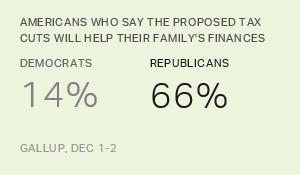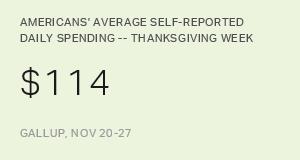Story Highlights
- Investor and Retirement Optimism Index at 17-year high in fourth quarter
- Retired investors' optimism edges out nonretired investors'
- Republicans' optimism continues to outpace Democrats' by wide margin
WASHINGTON, D.C. -- U.S. investor optimism has remained strong in the fourth quarter, with investors mostly upbeat about the 12-month outlook for the economy, the stock market, unemployment and their personal finances. This is reflected in the Wells Fargo/Gallup Investor and Retirement Optimism Index, which hit +140 in the fourth-quarter poll. While similar to the +138 recorded in the third quarter, it is up from +96 a year ago and is technically the highest since September 2000, when it was +147.

Retired investors are more optimistic than nonretired investors, with retirees' index score averaging +151 in the fourth quarter versus +135 for nonretirees -- though both figures are strong.
Retirees' greater optimism mainly stems from their more upbeat views about four aspects of the economy measured in the index, particularly inflation. Retiree optimism lags that of nonretirees on two of three aspects of the index focused on personal income and investments.
| Retirees | Nonretirees | |||||||||||||||||||||||||||||||||||||||||||||||||||||||||||||||||||||||||||||||||||||||||||||||||||
|---|---|---|---|---|---|---|---|---|---|---|---|---|---|---|---|---|---|---|---|---|---|---|---|---|---|---|---|---|---|---|---|---|---|---|---|---|---|---|---|---|---|---|---|---|---|---|---|---|---|---|---|---|---|---|---|---|---|---|---|---|---|---|---|---|---|---|---|---|---|---|---|---|---|---|---|---|---|---|---|---|---|---|---|---|---|---|---|---|---|---|---|---|---|---|---|---|---|---|---|---|
| % | % | |||||||||||||||||||||||||||||||||||||||||||||||||||||||||||||||||||||||||||||||||||||||||||||||||||
| 12-month outlook for … | ||||||||||||||||||||||||||||||||||||||||||||||||||||||||||||||||||||||||||||||||||||||||||||||||||||
| Economic growth | 69 | 64 | ||||||||||||||||||||||||||||||||||||||||||||||||||||||||||||||||||||||||||||||||||||||||||||||||||
| Stock market | 69 | 61 | ||||||||||||||||||||||||||||||||||||||||||||||||||||||||||||||||||||||||||||||||||||||||||||||||||
| Unemployment | 68 | 60 | ||||||||||||||||||||||||||||||||||||||||||||||||||||||||||||||||||||||||||||||||||||||||||||||||||
| Inflation | 52 | 41 | ||||||||||||||||||||||||||||||||||||||||||||||||||||||||||||||||||||||||||||||||||||||||||||||||||
| Outlook for personal finances | ||||||||||||||||||||||||||||||||||||||||||||||||||||||||||||||||||||||||||||||||||||||||||||||||||||
| Reaching 12-month investment targets | 72 | 65 | ||||||||||||||||||||||||||||||||||||||||||||||||||||||||||||||||||||||||||||||||||||||||||||||||||
| Reaching five-year investment goals | 69 | 74 | ||||||||||||||||||||||||||||||||||||||||||||||||||||||||||||||||||||||||||||||||||||||||||||||||||
| Maintaining or increasing income over next year | 65 | 74 | ||||||||||||||||||||||||||||||||||||||||||||||||||||||||||||||||||||||||||||||||||||||||||||||||||
| Wells Fargo/Gallup Investor and Retirement Optimism Index, Nov. 1-5, 2017 | ||||||||||||||||||||||||||||||||||||||||||||||||||||||||||||||||||||||||||||||||||||||||||||||||||||
The latest poll of 1,015 U.S. investors with $10,000 or more in stocks, bonds or mutual funds was conducted Nov. 1-5. The index, first measured in 1996, was consistently above +100 in its early years, peaking at +178 in January 2000 at the height of the dot-com boom. It remained above +100 through the end of that year, but then fell to +96 in early 2001 and hit a low of -64 in February 2009 during the Great Recession.
After wobbling for nearly a decade, the index has steadily improved in the past year -- largely due to exuberance among Republicans. Republicans' score on the index jumped from -9 in the third quarter of 2016 to +145 in the fourth quarter of that same year -- a three-month period spanning the 2016 election. It has since edged up further to +220. Meanwhile, Democrats' index score plummeted from +166 to +32 a year ago -- but has since improved, now registering +56.
| Q3 2016 | Q4 2016 | Q1 2017 | Q2 2017 | Q3 2017 | Q4 2017 | ||||||||||||||||||||||||||||||||||||||||||||||||||||||||||||||||||||||||||||||||||||||||||||||
|---|---|---|---|---|---|---|---|---|---|---|---|---|---|---|---|---|---|---|---|---|---|---|---|---|---|---|---|---|---|---|---|---|---|---|---|---|---|---|---|---|---|---|---|---|---|---|---|---|---|---|---|---|---|---|---|---|---|---|---|---|---|---|---|---|---|---|---|---|---|---|---|---|---|---|---|---|---|---|---|---|---|---|---|---|---|---|---|---|---|---|---|---|---|---|---|---|---|---|---|
| Total investor optimism | +79 | +96 | +126 | +124 | +138 | +140 | |||||||||||||||||||||||||||||||||||||||||||||||||||||||||||||||||||||||||||||||||||||||||||||
| Republican investor optimism | -9 | +145 | +200 | +205 | +220 | +220 | |||||||||||||||||||||||||||||||||||||||||||||||||||||||||||||||||||||||||||||||||||||||||||||
| Democratic investor optimism | +166 | +32 | +47 | +51 | +46 | +56 | |||||||||||||||||||||||||||||||||||||||||||||||||||||||||||||||||||||||||||||||||||||||||||||
| Wells Fargo/Gallup Investor and Retirement Optimism Index, Nov. 1-5, 2017 | |||||||||||||||||||||||||||||||||||||||||||||||||||||||||||||||||||||||||||||||||||||||||||||||||||
Survey Methods
Results for this Wells Fargo/Gallup Investor Optimism and Retirement Index poll are based on telephone interviews conducted Nov. 1-5, 2017, on the Gallup U.S. Daily survey, with a random sample of 1,015 adults, aged 18 and older, living in all 50 U.S. states and the District of Columbia having investments of $10,000 or more.
For results based on the total sample of national adults, the margin of sampling error is ±4 percentage points at the 95% confidence level. All reported margins of sampling error include computed design effects for weighting.
Each sample of national adults includes a minimum quota of 70% cellphone respondents and 30% landline respondents, with additional minimum quotas by time zone within region. Landline and cellular telephone numbers are selected using random-digit-dial methods.
Learn more about how the Wells Fargo/Gallup Investor and Retirement Optimism Index poll works.




